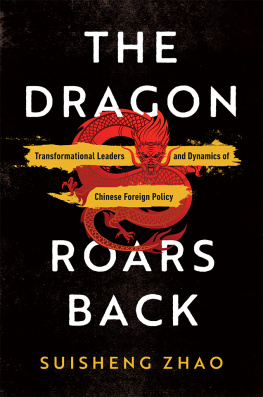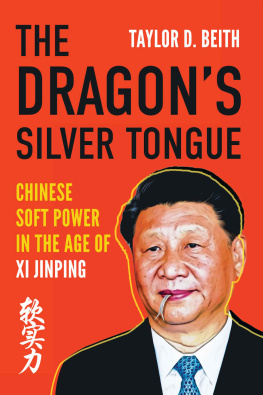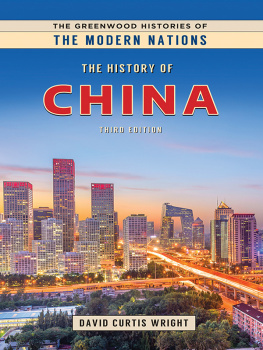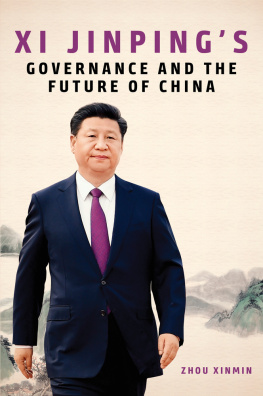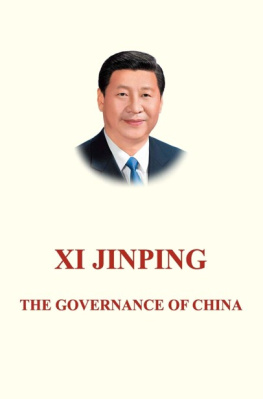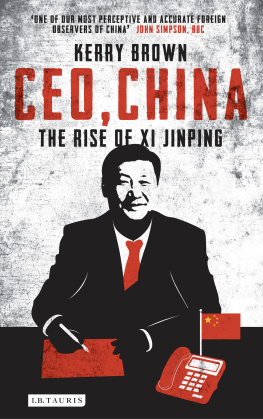Xi Jinpings Adages
A Guide to the Chinese Leaders Classical Allusions
compiled by Publicity Department of the Communist Party of China
in association with China Media Group
ACA Publishing Ltd
A Note from the Editor
This book is based on a 2018 television special, broadcast on China Central Television to an audience of 441 million. Its title was (Png Y Jn Rn), a clever play on words which roughly translates to Xi Jinpings Language is Close to the People.
The aim of the programme and its accompanying book was to shed light on the thoughts of the General Secretary as voiced in his key speeches, as well as to popularise the Chinese classics and emphasise the relevance of Chinas rich cultural heritage to the countrys prospects as a modern nation.
Xi Jinpings Adages, our concise English edition of Png Y Jn Rn, excerpts quotes from thirty-five of the speeches covered in the television special and pairs them with expert analysis transcribed from its screenplay. Reading this officially sanctioned analysis of the Chinese leaders classical allusions affords a unique and interesting perspective on the state of China today as the country reconciles itself with the cultural traditions, literary heritage and ancient philosophy it once rejected in the name of progress. This book shows how, in a way, things have come full circle. Education and tradition, once frowned upon by the CPC, are now held up as important prerequisites for the countrys future development.
Beyond erudite explanation and analysis of classic aphorisms, this book teems with anecdotes about Xi Jinpings own life and how he has put the words of the sages into practice, be it as leader of the Party, figurehead of the nation or as a young man in the countryside undergoing education through labour.
So whether youre interested in China's culture and classics, its political and economic development, or the life and times of its paramount leader Xi Jinping, we believe this brief volume will satisfy your curiosity.
A Note from the Chinese Publishers on Cultural Self-Confidence
Cultural self-confidence is a force that is more basic, goes deeper and lasts longer in the development of a country and a nation, and naturally the Chinese peoples cultural self-confidence is closely linked to Chinas fine traditional culture. General Secretary Xi Jinping has emphasised previously that in the new era, the Chinese people need to promote Chinese culture and to realise its creative transformation and innovative development. In this respect, he himself has led by example. In a series of important speeches and articles that have left a deep impression on people, no matter whether talking about major issues of governing a country, or defining Chinas principles, viewpoints or positions on international occasions, or talking with cadres and the common people at grassroots level, he has frequently quoted pearls of wisdom from classical Chinese literature. Not only has he accurately interpreted the quintessential excellence of traditional Chinese culture, he has also added new connotations in keeping with the times, which shine with the ideological radiance of a new era. These quotations vividly blended with his plain language of the ordinary people, brings the characters in the classics back to life again.

interpretation
in part 1 provided by
-
Professor Wang Liqun
Deputy Director of the Centre for the
System of Socialism with Chinese Characteristics Studies
&
Professor Guo Jianning
Deputy Director of the Research Centre for the Theoretical System of Socialism with Chinese Characteristics, Peking University
ONE
WHAT IS FOR THE PEOPLE?
Zheng Banqiao from the Qing dynasty was a well-known painter and a man of letters. He served for a long time as a magistrate in Fan county, Henan province and in Wei county, Shandong province. (As a magistrate), he attached importance to farming and sericulture and he aided the victims of natural disasters. In his office there was never any backlog of work on his desk, while at home none of his property was obtained by bribery. He was an incorruptible, upright and honest official, therefore he enjoyed public support. His poem In my magistrates residence I lie listening to bamboo rustling, it sounds like the people moaning in distress. We may be modest as small county officials, but we are concerned for every leaf on every branch has become an eternal aspiration of loving the people.
XI JINPING
This speech was given by General Secretary Xi Jinping on 9 May 2014 when he participated in a meeting of the Party Standing Committee of Lankao county, Henan province, on the subject of democratic life, in which he alluded to a poem by Zheng Banqiao from the Qing dynasty. General Secretary Xi is particularly fond of this poem, so he has alluded to it on many occasions. Why does he attach such importance to this poem?
According to Professor Wang Liqun:
This poem was written when Zheng Banqiao was the magistrate of Wei county in Shandong province. It has a rather long title - Painting Bamboo for Governor Bao fromthe Magistrates Residence in Wei County. When it was composed, Wei county was experiencing a natural disaster. What was Zheng Banqiaos solution for the problems related to the unfortunate victims livelihood? He undertook a capital construction project and let the civilians engage in the building work. Anyone who took part in the construction work got paid and fed. This action solved the problem of victims starving due to the natural disaster, therefore the poem expressed Magistrate Zhengs deep feelings for the people.
TWO
WHY FOR THE PEOPLE?
Government thrives when it is exercised in accordance with the will of the people and declines when it goes against the will of the people. For a political party or a political power, its future and destiny ultimately depend on the will of the people.
XI JINPING
On 21 September 2014, General Secretary Xi Jinping gave the above explanation at a meeting to celebrate the 65th anniversary of the establishment of the Chinese Peoples Political Consultative Conference (CPPCC).
According to Professor Wang Liqun:
The two lines quoted here by General Secretary Xi are from the chapter on Shepherding the People (Mumin) of the Guanzi, which is a collection of related treatises and articles of Guan Zhong in the Spring and Autumn Period (770-476BC). The Four Acts of Submission to the Will of the People (Sishun) was a section of Mumin talking about how Political power thrives when it is exercised in accordance with the will of the people and declines when it goes against the will of the people. The key point here is that popular support is the ultimate decisive factor for the rise and fall of state power.
Many ancient Chinese scholars understood this argument of Guan Zhong very well, particularly some of the grassroots-level officials. One official who was recorded in the Biography of Tong Hui in TheBook of the Later Han



